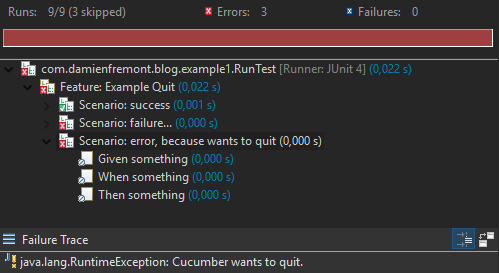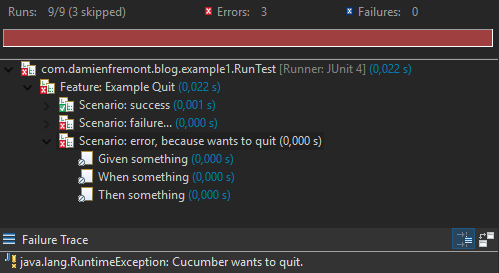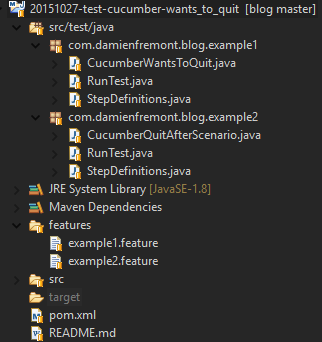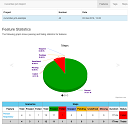
Ruby Example
After do |s|
# Tell Cucumber to quit after this scenario is done - if it failed.
Cucumber.wants_to_quit = true if s.failed?
end
Java Example
@After
public void after(Scenario s) throws Exception {
// Tell Cucumber to quit after this scenario is done - if it failed.
CucumberHooks.wantsToQuit = true == s.isFailed();
}
Example 1: Wants ot Quit
Before

After

Example 2: Quit After Tagged Scenario fails
Before

After

Source

Example 1: Wants ot Quit
CucumberHooks .java
package com.damienfremont.blog.example1;
import cucumber.api.Scenario;
import cucumber.api.java.Before;
public final class CucumberHooks {
public static boolean wantsToQuit = false;
@Before
public void quitIfRequested(Scenario scenario) {
if (wantsToQuit)
throw new RuntimeException("Cucumber wants to quit.");
}
}
example1.feature
Feature: Example Quit
Scenario: success
Given something
When something
Then something
Scenario: failure...
Given something
When something
Then something bad
Scenario: error, because wants to quit
Given something
When something
Then something
StepDefinitions.java
package com.damienfremont.blog.example1;
import cucumber.api.Scenario;
import cucumber.api.java.After;
import cucumber.api.java.en.Then;
import cucumber.api.java.en.When;
public class StepDefinitions {
@When("^something$")
public void do_something() throws Throwable {
// something
}
@Then("^something bad$")
public void quit() throws Throwable {
throw new RuntimeException("Fail!");
}
@After
public void after(Scenario s) throws Exception {
// Tell Cucumber to quit after this scenario is done - if it failed.
CucumberHooks.wantsToQuit = true == s.isFailed();
}
}
RunTest.java
package com.damienfremont.blog.example1;
import org.junit.runner.RunWith;
import cucumber.api.CucumberOptions;
import cucumber.api.junit.Cucumber;
@RunWith(Cucumber.class)
@CucumberOptions(strict = true, features = "features/example1.feature")
public class RunTest {
}
Example 2: Quit After Tagged Scenario fails
CucumberHooks.java
package com.damienfremont.blog.example2;
import java.util.Collection;
import cucumber.api.Scenario;
import cucumber.api.java.After;
import cucumber.api.java.Before;
public final class CucumberHooks {
private static final String TAG = "@important";
private static boolean prevScenarioFailed = false;
@After
public void watch_this_tagged_scenario(Scenario scenario) throws Exception {
if (isTagged(scenario)) {
boolean isFailed = scenario.isFailed();
if (isFailed)
prevScenarioFailed = isFailed;
}
}
@Before
public void quit_if_tagged_scenario_failed(Scenario scenario) {
if (!isTagged(scenario) && prevScenarioFailed)
throw new IllegalStateException("An important scenario has failed! Cucumber wants to quit.");
}
private boolean isTagged(Scenario scenario) {
Collection<String> tags = scenario.getSourceTagNames();
return tags.contains(TAG);
}
}
example2.feature
Feature: Example Quit after tag
@important
Scenario: important 1, and fails
Given something
When fail
Then something
@important
Scenario: important 2, but run it anyway
Given something
When something
Then something
Scenario: optionnal, error because wants to quit
Given something
When something
Then something
StepDefinitions.java
package com.damienfremont.blog.example2;
import cucumber.api.java.en.Then;
import cucumber.api.java.en.When;
public class StepDefinitions {
@When("^something$")
public void do_something() throws Throwable {
// something
}
@Then("^fail$")
public void fail() throws Throwable {
throw new RuntimeException("Fail!");
}
}
RunTest .java
package com.damienfremont.blog.example2;
import org.junit.runner.RunWith;
import cucumber.api.CucumberOptions;
import cucumber.api.junit.Cucumber;
@RunWith(Cucumber.class)
@CucumberOptions(strict = true, features = "features/example2.feature")
public class RunTest {
}
Conclusion
Now, you have faster feedback:
- small execution time when all your tests fail (good for Continuous Integration).
- much readable results with multiple failures, instead of semi-skipped/failed state for each scenario (reporting)
Project
References
https://github.com/cucumber/cucumber/wiki/Hooks https://github.com/cucumber/cucumber-java-skeleton http://stackoverflow.com/questions/15272523/what-is-the-cucumber-jvm-equivalent-of-cucumber-wants-to-quit
Origin
https://damienfremont.com/2015/10/27/how-to-cucumber-java-wants-to-quit/











